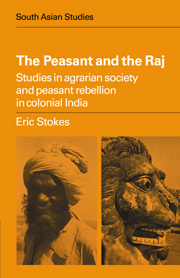Book contents
- Frontmatter
- Contents
- List of Maps
- Preface
- Introduction
- 1 The first century of British colonial rule: social revolution or social stagnation?
- 2 Privileged land tenure in village India in the early nineteenth century
- 3 Agrarian society and the Pax Britannica in northern India in the early nineteenth century
- 4 The land revenue systems of the North-Western Provinces and Bombay Deccan 1830–80: ideology and the official mind
- 5 Traditional resistance movements and Afro-Asian nationalism: the context of the 1857 Mutiny Rebellion
- 6 Nawab Walidad Khan and the 1857 Struggle in the Bulandshahr district
- 7 Rural revolt in the Great Rebellion of 1857 in India: a study of the Saharanpur and Muzaffarnagar districts
- 8 Traditional elites in the Great Rebellion of 1857: some aspects of rural revolt in the upper and central Doab
- 9 The structure of landholding in Uttar Pradesh 1860–1948
- 10 Dynamism and enervation in North Indian agriculture: the historical dimension
- 11 Peasants, moneylenders and colonial rule: an excursion into Central India
- 12 The return of the peasant to South Asian history
- Glossary
- Index
12 - The return of the peasant to South Asian history
Published online by Cambridge University Press: 20 October 2009
- Frontmatter
- Contents
- List of Maps
- Preface
- Introduction
- 1 The first century of British colonial rule: social revolution or social stagnation?
- 2 Privileged land tenure in village India in the early nineteenth century
- 3 Agrarian society and the Pax Britannica in northern India in the early nineteenth century
- 4 The land revenue systems of the North-Western Provinces and Bombay Deccan 1830–80: ideology and the official mind
- 5 Traditional resistance movements and Afro-Asian nationalism: the context of the 1857 Mutiny Rebellion
- 6 Nawab Walidad Khan and the 1857 Struggle in the Bulandshahr district
- 7 Rural revolt in the Great Rebellion of 1857 in India: a study of the Saharanpur and Muzaffarnagar districts
- 8 Traditional elites in the Great Rebellion of 1857: some aspects of rural revolt in the upper and central Doab
- 9 The structure of landholding in Uttar Pradesh 1860–1948
- 10 Dynamism and enervation in North Indian agriculture: the historical dimension
- 11 Peasants, moneylenders and colonial rule: an excursion into Central India
- 12 The return of the peasant to South Asian history
- Glossary
- Index
Summary
No platitude could be more trite than that the balance of destiny in South Asia rests in peasant hands, yet no platitude has been grasped with more laggardliness by political scientists and historians. Part of the explanation is perhaps the split level at which South Asian society appears to operate. Charles Metcalfe and Karl Marx long ago gave vivid formulation to the notion of an underlying discontinuity between the political superstructure and the agrarian base. No doubt this insulation of the peasant world from the state is in some measure typical of all pre-modern autocracies, but in the Indian subcontinent it seemed to receive particular reinforcement from the brittle foreign-conquest character of the larger political systems and from what appeared to be the peculiar economic and social self-sufficiency of a village society regulated by the institutions of caste. As a result even the periodic irruption of the peasantry into politics through rebellion looks strangely absent in Indian history, unless one follows Irfan Habib in regarding the rise of the Maratha, Sikh and Jat powers in the later seventeenth and eighteenth centuries as essentially peasant movements, or believes with Kathleen Gough that constant peasant rebellion under colonial rule has been deliberately over-looked. It has, therefore, seemed natural to treat politics as a self-contained activity and relegate rural India to the role of a dim, shadowy backcloth to the political stage. This attitude survived the ending of colonial rule.
- Type
- Chapter
- Information
- The Peasant and the RajStudies in Agrarian Society and Peasant Rebellion in Colonial India, pp. 265 - 289Publisher: Cambridge University PressPrint publication year: 1978



